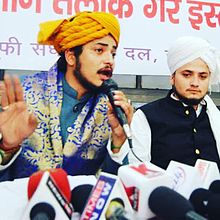Hasnain Baqai (Urdu: شاہ سید حسنین بقائی), also known as Shah Saheb, is an Islamic scholar and reformer.He is the patron and parts of various social, academic and other developmental activities of Sufi Sunni Muslims in India.[2] [3][4] He is the President of the All India Ulema and Mashaikh Board (AIUMB U.P), which is a Sufi movement in India.[5][6][7] One source describes him as having an inclusive and broadminded interpretation of Islam.[8]
Family Background
ositions and activities
He has held the following positions:
Opinions
Divorce
Hasnain Baqai disagrees with the notion of a "triple talaq" divorce. He believes that saying "talaq" three consecutive times in public does not amount to divorce. He said in an interview: "in the Shariat, uttering 'talaq' thrice at one go does not amount to divorce, and some maulanas are kicking up controversy to keep their domination in the community." He supported the central government's rendition of an opinion against the legality of 'triple talaq' divorce for Muslim women, during the proceedings of the Supreme Court. [17] [18] [19]
Involvement in Waqf Movement of Lucknow
The "Waqf Movement", or Tehreek-e-Awqaf, which is going on in Lucknow under the leadership of Kalbe Jawad and Baqai has achieved a nominal success to date.[20][21]
Execution of Nimr al-Nimr & Faris Zarani
In an interview condemning the execution of Nimr al-Nimr in Saudi Arabia, Baqai said: "One Shia and [one] Sunni cleric were hanged just because they were raising voices for minorities’ rights and against the sheltering of terrorism by Saudi Arabia."[22][23]
Unity work between Shia and Sunni
Baqai said in an interview Muslims should be awake, Muslims should be alert that if a dispute takes place among Sunni and Shi’ite brothers, it is harmful to all of us, it is harmful to all Muslims. Those who want to sow discord are neither Sunni nor Shia, they are agents of the superpowers and work for them. Shia’s and Sunnis brothers should avoid every kind of dispute. Today, discord among us will only benefit those who follow neither Shi’ia nor Hanafi. They neither want this nor that to exist, and know the way to sow dispute between you and us. he got threts call from terrorists for making unity between Shia and Sunni. Baqai claimed that he had both received threats from an anonymous telephone caller who warned them against speaking on "wahabism" and "terrorism" specially at the joint Shia-Sunni unity conference being organised on March 25 in Lucknow. [24] [25] [26] [27] [28] [29] [30] [31]


